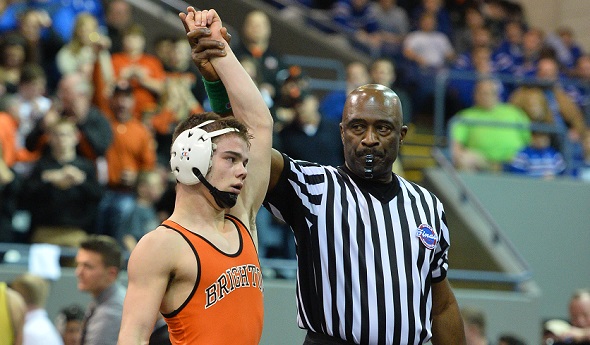
Davis Continues as MHSAA Mat Champion
April 15, 2015
By Geoff Kimmerly
Second Half editor
Sam Davis was a highly-touted freshman on the Michigan State University wrestling team and recently-crowned MHSAA champion from Lansing Eastern when an eye injury ended his competitive career on that mat.
But the longtime Lansing official continues to make a statewide impact on the sport he's loved for more than 50 years.
 Davis, one of the most accomplished wrestling officials in Michigan high school history and president of the Lansing Wrestling Officials Association for more than two decades, has been selected to receive the MHSAA’s Vern L. Norris Award for 2015. He will be honored at the Officials’ Awards & Alumni Banquet on May 2 at the Kellogg Center in East Lansing.
Davis, one of the most accomplished wrestling officials in Michigan high school history and president of the Lansing Wrestling Officials Association for more than two decades, has been selected to receive the MHSAA’s Vern L. Norris Award for 2015. He will be honored at the Officials’ Awards & Alumni Banquet on May 2 at the Kellogg Center in East Lansing.
The Norris Award is presented annually to a veteran official who has been active in a local officials association, has mentored other officials, and has been involved in officials’ education. It is named for Vern L. Norris, who served as executive director of the MHSAA from 1978-86 and was well-respected by officials on the state and national levels.
Davis is in his 35th year as an MHSAA-registered official, working wrestling during the entirety of his career and baseball seven of the last eight seasons.
This winter Davis officiated in his 26st MHSAA Team Wrestling Finals – or all but two in the event’s 28-season history – and including the individual tournament he’s worked 33 Finals in the wrestling after receiving his first MHSAA championship-level assignment in 1983.
“To be recognized for being able to help a sport you love, and are still actively involved in, it can’t really get much better than that,” Davis said. “I love being out on the mat, talking with kids, talking with coaches.
“Every year I train my officials to be State Finals officials. That doesn’t mean that’s where they’ll be. But I expect them to treat every dual meet, every tournament, like the State Finals, because it means that much to every kid.”
Davis, 64, was an MHSAA Wrestling Finals individual champion at 165 pounds as a senior at Lansing Eastern High School in 1969 and also a significant contributor when the Quakers won the Class A team championship in 1968.
He then joined Michigan State University’s wrestling program but suffered an eye injury as a freshman that forced him to give up competing in the sport. However, he instead took up judo, winning state championships in 1980 and 1981 and competing at the U.S. Olympic trials.
Davis previously had officiated wrestling during the 1971-72 season and returned to the high school mat for good in 1981, beginning that winter his current 34-season run as an MHSAA registered official in the sport. He also officiated National Junior College Athletic Association Finals in 1981 and 1982.
After graduating from MSU with bachelor and master’s degrees in 1974, Davis began his teaching career at Lansing Everett High School that fall. He taught history, psychology and U.S. government and coached wrestling and football and later served as an assistant principal at the school. Davis also served as principal at Dwight Rich Middle School and then district athletic director before finishing 32 years in the Lansing School District in 2007.
Davis is a lead teaching official at MHSAA wrestling clinics and also has served as Official in Charge, managing those working matches, at a number of MHSAA Wrestling Finals. He has served as president of the Lansing Wrestling Officials Association since 1992.
“Sam Davis’ passion for education shines through both on the mat and in how he stands as a leader in Michigan’s wrestling community, making impacts both visible but frequently behind the scenes as well,” MHSAA Executive Director John E. “Jack” Roberts said. “He continues to share his talents and expertise for the betterment of his local officials and also as a mentor statewide. We are pleased to recognize Sam Davis with the Vern L. Norris Award.”
Davis followed his career in education with another in law enforcement. At age 58, he attended the Mid-Michigan Police Academy at Lansing Community College and currently serves as a major with the Ingham County Sheriff’s Office, serving as jail administrator. He’s been elected for multiple terms as chairperson of the Michigan Sheriff’s Association Jail Administrators Committee.
Getting involved in wrestling during junior high school helped lay the foundation of discipline and dedication that Davis has transferred to his other sports and careers. He is known as an instructor who teaches by the book, and his background in education plays a key role as he educates those he works with now and who will take over leadership when he's done.
"I’m so blessed to have been able to have been a teacher and learned that craft, and to have those skills,” Davis said. “When you’re trying to mentor folks, you have to understand there are different learning styles, modalities of how people operate. With that background, I’m able to impart better than if I was a coach saying this is (the only way) how we do something better.”
Longtime MHSAA official Bill Allen has had a unique viewpoint of Davis' rise as a leader. He also was Davis' high school coach for the Quakers and co-founded the LWOA.
Davis' growth as a leader was rooted in part in a wrestling loss as a junior, his first of the 1967-68 season, that eliminated Davis from individual title contention. But Davis, after a conversation with Allen on the importance of a strong finish, battled back to take third at his weight and score key points toward the team's team championship.
"Similar to the person for whom this award is named, Sam Davis is a born leader," Allen said. "When Sam was a junior in high school, his wrestling teammates chose him as captain of their team, not only because of his exceptional high standards and communication skills, but also because of his work ethic. His leadership as captain was a big factor in that year's team winning the state championship.
"With Sam as president of the Lansing Wrestling Officials Association, you can be assured that the meeting will start on time, will have useful and meaningful dialogues and instructions, and that the meeting will end on time. If further help or information is needed, Sam is always available and willing to stay and provide assistance."
Davis also has participated in efforts for the Boys & Girls Club of Lansing and served on community boards for Lansing and Jackson-based Camp Highfields and the Capital Regional Community Foundation.
Previous recipients of the Norris Award
1992 – Ted Wilson, East Detroit
1993 – Fred Briggs, Burton
1994 – Joe Brodie, Flat Rock
1995 – Jim Massar, Flint
1996 – Jim Lamoreaux, St. Ignace
1997 – Ken Myllyla, Escanaba
1998 – Blake Hagman, Kalamazoo
1999 – Richard Kalahar, Jackson
2000 – Barb Beckett, Traverse City; Karl Newingham, Bay City
2001 – Herb Lipschultz, Kalamazoo
2002 – Robert Scholie, Hancock
2003 – Ron Nagy, Hazel Park
2004 – Carl Van Heck, Grand Rapids
2005 – Bruce Moss, Alma
2006 – Jeanne Skinner, Grand Rapids
2007 – Terry Wakeley, Grayling
2008 – Will Lynch, Honor
2009 – James Danhoff, Richland
2010 – John Juday Sr., Petoskey
2011 – Robert Williams, Redford
2012 – Lyle Berry, Rockford
2013 – Tom Minter, Okemos
2014 – Hugh R. Jewell, Detroit
High school game officials with 20, 30, 40, 45 and 50 years of service also will be honored at the Officials’ Awards & Alumni Banquet on May 2.
Fourteen officials with 50 or more years of service will be honored, along with 31 officials with 45 years. A 40-year award will be presented to 72 officials. In addition, 88 officials with 30 years and 167 officials with 20 years of experience will be honored. With the induction of this year’s group of 372, the honor roll of officials who have aided young student-athletes grows to 9,788 since the inception of the banquet in 1980. Click to see the full list of this year's honorees.
Tickets for the banquet are available to the public and priced at $20. They will not be sold at the door. Tickets can be ordered by calling the MHSAA office at (517) 332-5046 or by sending the order form available at this link.
PHOTO: Official Sam Davis, right, holds up a winner's hand during this season's MHSAA Division 1 Final.
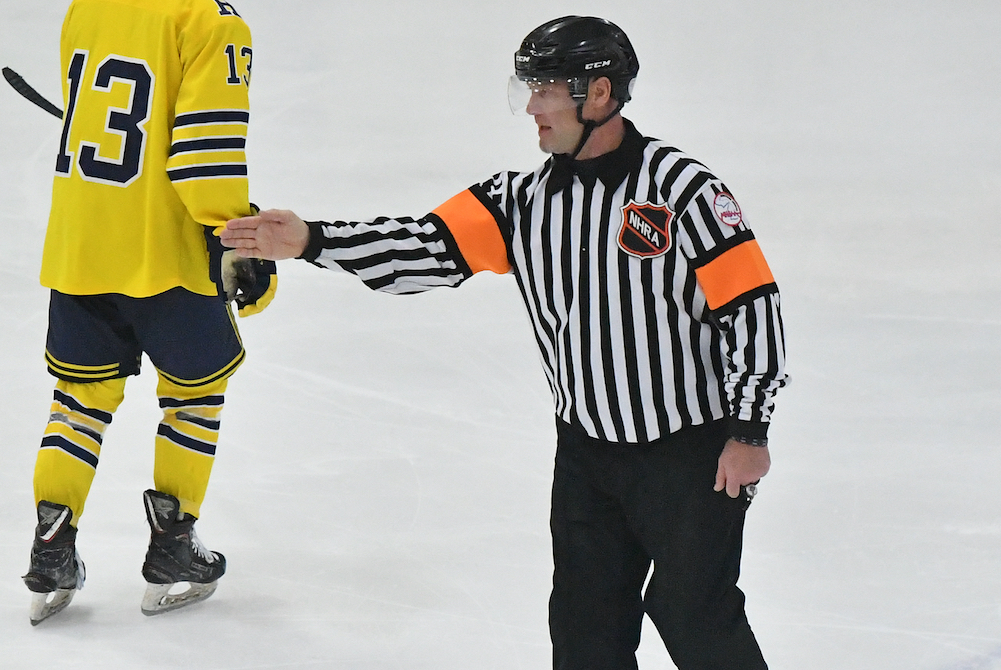
Retired NHL-er Back on Ice to Answer Call - By Making Them
By
Rob Kaminski
MHSAA benchmarks editor
March 16, 2023
The most accomplished skater on the ice during Friday’s triple-overtime MHSAA Division 1 Semifinal hockey thriller between Hartland and Brighton was not wearing the school colors of either team.
In front of a packed house at Plymouth’s USA Hockey Arena, referee Bryan Smolinski was in stripes, just like the rest of his officiating crew.
In his former life, he pulled on plenty of sweaters before lacing up the skates. That happens when one logs more than 1,000 games, tallies nearly 300 goals (274) and close to 400 assists (377) with eight teams spanning a 15-year playing career in the National Hockey League.
So, how did the 52-year-old former star player find himself on the ice last weekend as one of the referees for the pinnacle weekend of this high school season? Good question, even for the man known as “Smoke” during his playing days.
“I was working in youth development programs a few years back and reached out to some Michigan guys I had connections with about other ways to help the game,” Smolinski said. “I called Kevin May just to chat and asked, ‘Hey, how’s your reffing going?’ He said, ‘You know, we’re down a little bit,’ then said, ‘Why don’t you do it?’ I said, ‘Not a chance,’” Smolinski laughed.
Never Say Never
May persisted, imploring his friend to skate with him during a Fall league at Cranbrook in Bloomfield Hills. After eight weeks, once a week, Smolinski had a revelation.
“I’m like, ‘I’m kind of diggin’ this,’” Smolinski said “So, I did all the testing, and the educational part of it, and I really enjoyed it. I got with Danny (DiCristofaro) and his group, and he put me in as much as he could, and I really started to get my feet wet.”
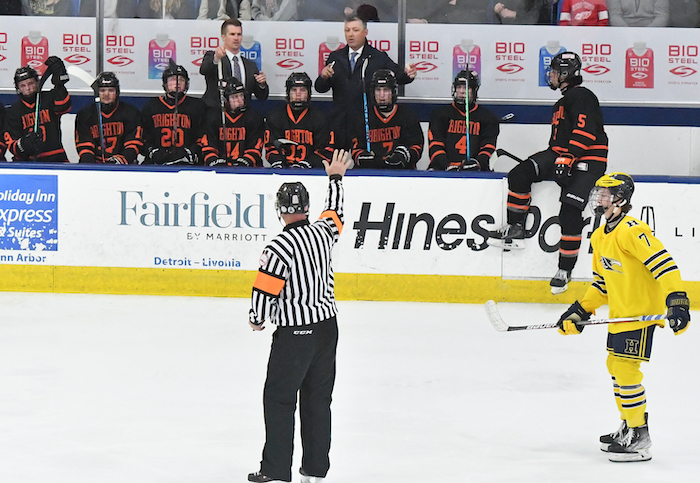 DiCristofaro is the assigner and referee-in-chief for the MHSAA’s Northeast Hockey Referees Association, and he has seen Smolinski’s growth first-hand.
DiCristofaro is the assigner and referee-in-chief for the MHSAA’s Northeast Hockey Referees Association, and he has seen Smolinski’s growth first-hand.
“Obviously he’s got great instincts and a feel for the game, along with a wealth of experience, all of which has allowed him to climb the ladder quickly,” said DiCristofaro. “It’s been a joy to watch his growth as an official.”
Fast forward to last Friday, and there were Smolinski and May sharing duties as referees during the MHSAA Semifinal with linesmen Michael Andrews and Thomas Robbins.
In between, there has been a learning curve that still continues, but the jump to officiating was not quite as daunting as his introduction to the NHL.
“I was scared to death. My first game was against Mario Lemieux. I’m in the old Boston Garden and now I’m playing against these guys and it’s their job, and they’re out there trying to make a living,” Smolinski recalled.
The emotions were not running nearly as frenzied for his first game as an MHSAA official, obviously, yet respect came in a different form.
“I couldn’t pick the puck up, I was breathing heavily; it was Kevin and me doing a two-man game in Brighton,” Smolinski recalled. “There were a few high-end kids playing, and I’m thinking, ‘I’m dying here.’ You know, there’s no training for that first time.”
What that experience did, however, was revitalize Smolinski in a new way. His playing career is well documented, not only in the NHL, but around Michigan. He enjoyed an honor-laden career at Michigan State University from 1989-93 before joining the Boston Bruins (who had drafted him three years earlier) at the end of the ’93 NHL campaign. Even after his final season, with Montreal in 2007-08, he stayed in the game via men’s leagues, or coaching his son, Max.
Smolinski and his wife, Julie, have three daughters: Ashtyn (22), Jojo (16) and Rylen (12), along with Max, whom dad coached for seven years including during a national championship run with a Little Caesars U15 team in 2019. Max, 19, is now playing collegiately at Rensselaer Polytechnic Institute.
So, for Smolinski, officiating offers a new chapter.
“Reffing brought back ... I wouldn’t say love of the game, because that’s always been there; it’s a different side of enjoying the game now. I have no horse in the race, my son’s off to college, my daughters are doing their thing; I wanted to find something new in the game,” Smolinski said. “I’ve coached, and I don’t want to do that. I found this, and I’ve stuck with it.”
Old College Ties
One of the great benefits of athletics at any level are the friendships made. For two kids who met in their first years on the MSU campus and forged a bond that lasts to this day, it’s amazing how their careers reached the pinnacle and have now come full circle.
Wes McCauley, an MSU teammate, is one of Smolinski’s best friends. After numerous years in the minor leagues, McCauley, like his friend, made it to the NHL. But McCauley made it as an official, working his first NHL game in 2003, when Smolinski was nearing the end of his playing career.
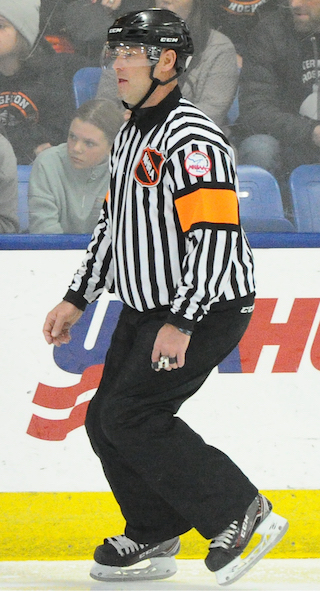 Their games lined up on just a few occasions in the NHL, and the two lobbied hard to have McCauley work Smolinski’s 1,000th career game in his final season with the Canadiens in 2007-08. The request, sadly, was denied by the league.
Their games lined up on just a few occasions in the NHL, and the two lobbied hard to have McCauley work Smolinski’s 1,000th career game in his final season with the Canadiens in 2007-08. The request, sadly, was denied by the league.
On the rare occasions when the friends did share the same ice, less than a handful by Smolinski’s count, it was McCauley who was forced to rebuff any attempts at fraternization. It’s just part of an official’s edict.
“For both of us, it was amazing; it was just great,” Smolinski said. “I’d say, ‘Hey man what’s up?’ and he says, ‘Can’t talk.’ I’m like, ‘What do you mean, we talk all the time.’ Again, he’s like, ‘Can’t talk, get away from me.’ You know, it was just business.”
McCauley then reached the 1,000-game plateau himself in 2018 and is still going strong as a regular selection for playoff duties with nine Stanley Cup Finals assignments, including last year.
So, it should have been natural for Smolinski to go to his old friend immediately for officiating pointers once he joined the ranks, right? Well, maybe not immediately.
“I talk to Wes all the time, but I actually hid it from him right out of the gate because I didn’t want to take his razzing. Eventually it got out, and he was loving it. He started sending me whistles and visors and pants,” Smolinski said, grinning. “And none of it fit, you know, because I’m older and fatter, and he’s so damn skinny. So, I still had to go out and get all new gear.”
Both Sides Now
Having been to the top of his profession, now moving to the other side of that same mountain that his friend McCauley scaled, the respect has grown for those blowing the whistle.
“The preparation for officiating is much more mental,” Smolinski said. “Way more rules oriented. You’re always trying to get away with things that you can as a player; now you have to police that.”
Smolinski has a distinct advantage.
“I know everything they’re trying to do because I’ve done it. I know where you’re going with the puck, I know what kind of breakout you’re trying to do,” Smolinski said. “I have all the instincts, now I just try to stay out of the way and not ruin their game. The most fun is watching the game develop and the ups and downs. For me to be out there and enjoy it with them, that’s the fun part.”
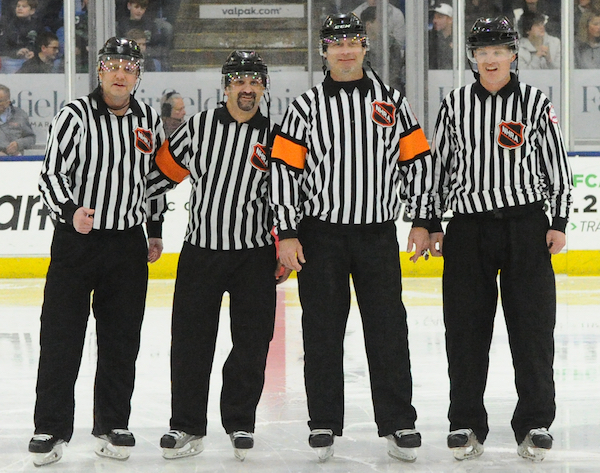 Those who have played hockey at any level have a built-in advantage should they consider the officiating avocation: the ability to skate. Unlike officiating in any other sport, skating is a prerequisite. This makes the pool limited, and almost solely composed of former players. Smolinski offers this advice.
Those who have played hockey at any level have a built-in advantage should they consider the officiating avocation: the ability to skate. Unlike officiating in any other sport, skating is a prerequisite. This makes the pool limited, and almost solely composed of former players. Smolinski offers this advice.
“I prefer sticking with high school because I think there’s more decorum, more administrative structure. Kids are playing for their schools, there’s loyalty there,” said Smolinski. “And there is more accountability. People need report to athletic directors and supervisors. Other levels can be more loosely governed, or a bit more maverick in nature. Moms and dads get involved more, coaches maybe know a little less,” said Smolinski.
He has, in fact, worked a handful of non-school games, and there’s a stark difference.
“I wanted to see what was going on, and I see it first-hand,” Smolinski said. “There are some crazy people and parents out there, and these guys are getting absolutely tortured. I’ve been tortured. There has to be a level of respect for what officials do. I think schools can rein that in a little more. All the guys I’ve met give up a lot of time and work hard because they love to do it and love the game.”
All sports need an assist from school administration and from those who once played the games to keep the officials recruitment moving in the right direction. People like Smolinski can help.
“He clearly doesn’t need to do this, and that’s what makes it so fantastic,” DiCristofaro said. “We need more people who have played – at any level – to do what he’s done and stay in the game as officials.”
Smolinski continues to promote the game in other ways as well. Currently, he is involved in the NHL’s Learn To Play initiative, which aims to inspire youth and welcome more families into the hockey community.
“We work hand-in-hand with the NHL Players Association for player development and industry growth,” Smolinski said. “Ages 5 to 9 are introduced to hockey, get head-to-toe gear and instruction, and meet some former players.”
The idea is to have fun first, which can translate into years and maybe even a lifetime in the sport. It’s a lifetime that has given Smolinski so much and continues to do so as he watches it unfold for others from his new vantage point.
PHOTOS (Top) MHSAA official Bryan Smolinski signals during Friday's Division 1 Semifinal between Brighton and Hartland. (2) Smolinski, a retired NHL standout, communicates with the Bulldogs' bench. (3) Smolinski keeps watch during game play. (4) Smolinski, third from left, with his crew: Michael Andrews, Kevin May and Thomas Robbins.

